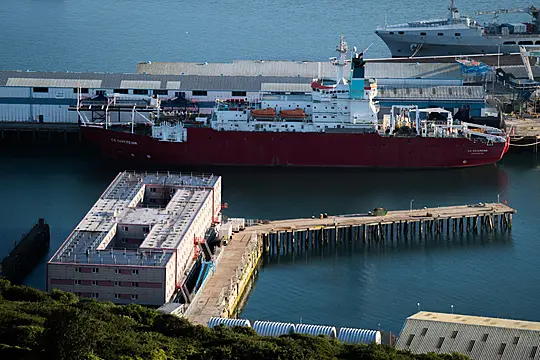Asylum seekers in the UK could return to the Bibby Stockholm barge within days, Britain's health minister said as he claimed the discovery of Legionella bacteria on the vessel was a “teething issue”.
Will Quince said the migrants will only return to the barge, moored in Portland Port, Dorset, if it is safe to do so.
He also defended the British government’s efforts to forge international deals on tackling the migrant crisis after reports that the European Union has told the UK it is not willing to negotiate an agreement to return people who arrive on small boats.
Asylum seekers were placed on board the Bibby Stockholm on Monday last week, but were removed on Friday after tests revealed Legionella – the bacteria which can cause the potentially fatal Legionnaires’ disease.

Mr Quince told LBC Radio: “Of course public health and safety is key, but we hope in the next few days we will be able to start getting people on to the Bibby Stockholm.
“It is absolutely the right thing to do but public health and safety is always our paramount concern.”
He told TalkTV the government remains committed to the plan to use the barge and other vessels like it, adding: “I think with Bibby Stockholm there was certainly a teething issue there.
“But we are absolutely determined to stick to the plan because we know that deterrence is working.”
Meanwhile, the Daily Mail and The Times reported that Brussels has rebuffed calls for a returns agreement.
It would mean the UK is unlikely to be able to send people arriving on small boats across the Channel back to France in the near future.
British prime minister Rishi Sunak has pushed for a bilateral returns agreement with Paris, but French president Emmanuel Macron believes any deal must be at an EU level.
A leaked memo reported by the two newspapers suggests such a pact is not being entertained by Brussels, which is dealing with its own internal rows over migration and refugee returns reforms.
Mr Quince highlighted an agreement with Turkey to tackle criminal gangs, the French arrangement on preventing crossings, and the Albania returns deal as examples of measures the British government has put in place internationally.
He told Sky News: “If you look at the arrangements that we do have with Turkey, with Albania, and indeed with the French, they are starting to bear fruit and then, more widely, if you look at the deterrent factor, again that is making a difference.”
The British government said it “remains open” to working towards a UK-EU returns accord, with Brexit having taken London out of the Dublin Agreement which currently allows for member states to return refugees.

The Times suggested any Brussels deal would likely come with the condition that Britain shares in Europe’s effort to resettle hundreds of thousands of migrants entering the EU through irregular means, including migrants arriving by boat to Italy or Greece.
But, citing leaked Cabinet Office notes, the newspaper said a senior aide to European Commission president Ursula von der Leyen had rejected negotiations on fresh terms following a push by Mr Sunak during talks at the Council of Europe in Iceland in May.
German politician Bjoern Siebert, Ms von der Leyen’s head of cabinet, is said to have told Sir Tim Barrow, the UK’s national security adviser and a former ambassador to the EU, that the “commission is not open to a UK-EU readmissions agreement”.
The commission reportedly disputes this version of events.
A British government spokesperson said: “We remain open to working with the EU to take forward negotiations on a UK-EU returns deal, as part of our international efforts to tackle illegal migration and to crack down on these exploitative gangs.
“We are in regular conversations with our European counterparts on a range of issues relating to migration and asylum.
“We agreed with members of the Calais Group of Northern European nations to work towards an EU-UK co-operation agreement on migration in a joint statement at the group’s December 8, 2022 meeting.”







